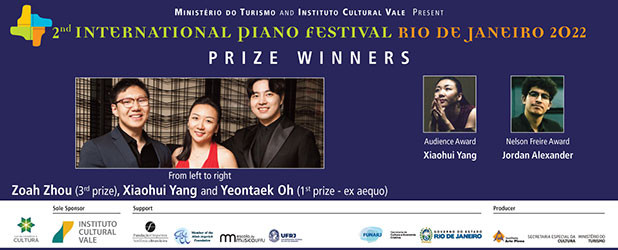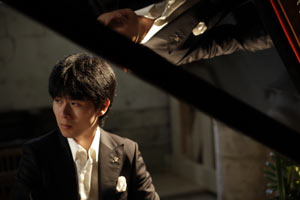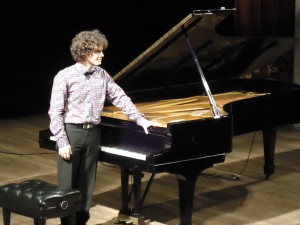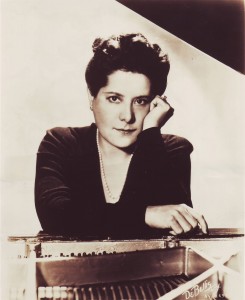‘ Festival ’ Category
Ensemble São Paulo will play with the candidates of the BNDES International Piano Competition in the chamber music round
Formed by musicians who won winners of the APCA and Carlos Gomes Awards, Ensemble São Paulo faces a busy schedule of presentations both in Brazil and abroad, with a repertoire ranging from pre-classical to contemporary composers. The trio participates as guest musicians of the 2012 edition of BNDES International Piano Competition of Rio de Janeiro, and will be on stage with the candidates at the BNDES’ Auditorium for the semifinal rounds , on December 3rd and 4th, in order to present quartets by Mozart, Schumann and Brahms.
See below the Ensemble São Paulo members biographies.
BETINA STEGMANN – violin
Buenos Aires-born Betina Stegmann started her violin studies in São Paulo with Lola Benda and then Erich Lehninger. She graduated from the Cologne College of Music in Germany, where she studied violin with Igor Ozim and chamber music with the Amadeus Quartet. Soon afterwards she moved to Tel Aviv, Israel, where she pursued further studies with Chaim Taub, later taking courses with Pinchas Zukerman and Max Rostal. She has performed concertos and recitals in several cities of Brazil, Argentina, Italy, Germany, the USA and Belgium. She has recorded for WDR radio (Germany) and RAI – Trieste (Italy), premiering new music by contemporary composers. Ms. Stegmann has taken part in several festivals in Brazil and abroad and is a member of the D’Elas Quintet, which won the Carlos Gomes Prize for chamber music in 1998. She is the leader of the Villa-Lobos Chamber Orchestra and teaches the violin at Cantareira University. She is also a member of the São Paulo City String Quartet.
MARCELO JAFFÉ – viola
Marcelo Jaffé started playing the violin at the age of six under the guidance of his father, Alberto Jaffé. In 1977, aged 14, he switched to the viola and in this same year he won 1st Prize at the National Competition of the University of Brasilia. After furthering his studies at the University of Illinois and Tanglewood Music Center, both in the USA, he went on to perform in several countries as a member of leading chamber ensembles and orchestras. He has conducted Kamerata Philarmonia and was Artistic Director of the São Paulo State Jazz Symphony Orchestra. He currently lives in São Paulo, where he teaches the viola at the São Paulo University School of Communication and Arts. He is a presenter for Radio Cultura and a member of the São Paulo City String Quartet.
ROBERT SUETHOLZ – cello
Born in Milwaukee, Wisconsin, USA, Roberto Suetholz studied under George Sopkin, founding member of the Fine Arts Quartet, Wolfgang Laufer, currently the cellist with the same quartet, and Uzi Wiesel, cellist with the Tel Aviv String Quartet, Israel. He took master classes with Janos Starker, Isaac Stern and Chaim Taub. In 1997 he gained his Masters in cello under the supervision of Hans Jørgen Jensen, at Northwestern University, Chicago (USA). He has worked with several international orchestras, including the Israel Sinfonietta (three years as lead cellist) and the Milwaukee Symphony Orchestra (USA). He has lived in Brazil since 1985, leading the cello sections of the University of São Paulo Symphony Orchestra, the São Paulo State Symphony Orchestra and Sinfonia Cultura, the orchestra of Rádio Cultura and TV Cultura. He is professor of cello at the University of São Paulo and a member of the São Paulo City String Quartet.
Guiomar Novaes of Brazil
One of the most outstanding names in Brazilian music of all times, pianist Guiomar Novaes had her artistic career reviewed in Guiomar Novaes of Brazil, a book by journalists Luciana Medeiros and João Luiz Sampaio. The book, released by BNDES International Piano Competition of Rio de Janeiro in 2011, retrieves important aspects of the history of the soloist, particularly the rise of her career in the U.S. In addition to disclosing unpublished information about this period of Novaes’ music and life, the project includes the release of two CDs with rare recordings of the pianist as soloist of the New York Philharmonic, conducted by Leonard Bernstein, George Szell and André Cluytens.
The book Guiomar Novaes of Brazil can be found at the Cultura, Travessa and Leonardo da Vinci bookstores. It is also available at the webstore Classicos.
Competition pays homage to Almeida Prado
Brazil lost an extraordinary artist in 2010: with an output over of 300 compositions, José Antônio de Almeida Prado left an indelible mark on the Brazilian symphonic production with his multifaceted style, a blend of traditional Brazilian music with atonal post-serialist and post-modernist elements. Almeida Prado, a former student of Olivier Messiaen and Nadia Boulanger, will be honored in the 2012 edition of BNDES International Piano Competition of Rio de Janeiro, being his piece Cartas Celestes (Celestial Maps) part of the repertoire of the semifinal rounds. The series of pieces stems from the composer’s doctoral thesis, and is regarded as one of the most outstanding pieces for piano from the last century.
2011 BNDES International Piano Competition comes to an end
The soloists Fabio Martino, Lukas Geniusas and Kotaro Fukuma closed the young pianists phase of BNDES International Piano Festival in Rio de Janeiro. They performed throughout this week (Tuesday, Friday and Saturday), at Leopoldo Miguez Music School. The Festival national tour – with recitals in Aracaju, Fortaleza, Recife, Belem and Manaus – ends on Monday, December 12, with the presentation of Kotaro Fukuma at Amazonas Theater.
On Sunday, Nelson Freire’s performance at the Municipal Theater of Rio de Janeiro closes the Festival in the city.
Watch Fabio Martino playing SCHUMANN – Drei Fantasiestucke op. 111
Kotaro Fukuma, winner of second prize in the BNDES International Piano Competition in 2010, plays in Rio on Saturday December 10, and in Manaus on December 12.
The young pianist Kotaro Fukuma, who won second prize in the BNDES International Piano Competition in 2010, gave an interview between concerts, by email, to the Competition site (“I am writing as I leave from Berlinfor New York”). Kotaro will play in Rio de Janeiroon Saturday December 10, in the Salão Leopoldo Miguez of the Escola de Música of UFRJ, at 7 p.m., and in the Amazonas Opera House, in Manaus, on Monday the 12th.
Narrating how music came early into his life (“my older sisters studied piano and I insisted on lessons – which started on my fifth birthday”), he shows how extremely happy he is to return toBrazil– and very interested in going to the Amazon.
- I’m dying to know the region,” he says. “I was very honoured by last year’s prize, when I came toBrazilfor the first time. I had ten fantastic days there, especially plaing the Liszt Concerto nº 2 with the Brazilian Symphony Orchestra inRio’s beautiful Opera House in the finals. I loved the Brazilian food, the nature and also the cordiality.”
Kotaro knows Bossa-Nova: “Elisa (sic) Reginasinging Águas de Marco!”; and he likes Techno music (“for dancing!”), pop, jazz and French songs. “But obviously I listen to classical music most of the time”. His study routine normally comprises three to five hours at the piano per day; but at times of great demand, such as before a competition, the time dedicated to piano practice goes up to six hours. Despite this, he cultivates a number of interests such as sport and gastronomy, and wants to learn a lot of languages, including Portuguese.
Before arriving in Rio, Kotaro will play in the Weill Hall at Carnegie Hall in New York. His Brazilian programme has pieces by Bach, Beethoven, and 3 Ls: Liszt, Ligeti and Liapounov.
The Festival continues: Evgeny Brakhman plays in the Salão Leopoldo Miguez in the Escola de Música of UFRJ, in Rio, and Fábio Martino plays in Fortaleza
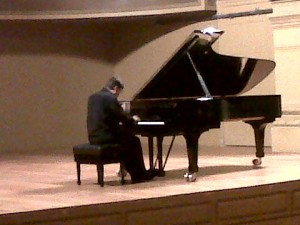 The first two recitals of the BNDES International Piano Festival, after the opening with Daniil Trifonov in the Rio Opera House, took place on Tuesday November 29 and Wednesday November 30. On Tuesday the Russian pianist Evgeny Brakhman, who won third place in the II BNDES International Piano Competition of Rio de Janeiro in 2010, played in the Salão Leopoldo Miguez of the Escola de Música of UFRJ, playing on the new Steinway acquired by BNDES. “The Salão has wonderful acoustics and the piano is outstanding” Brakhman later declared. The programme was Bach- Busoni (Chaconne in D minor), Rachmaninov (Three preludes op. 23 eand 32), Brahms (Six pieces op. 118) and Prokofiev (Sonata nº 7 in B flat major op. 83 ). Brakhman will play this Saturday, December 3, in the Biblioteca Epifâneo Dórea, in Aracaju.
The first two recitals of the BNDES International Piano Festival, after the opening with Daniil Trifonov in the Rio Opera House, took place on Tuesday November 29 and Wednesday November 30. On Tuesday the Russian pianist Evgeny Brakhman, who won third place in the II BNDES International Piano Competition of Rio de Janeiro in 2010, played in the Salão Leopoldo Miguez of the Escola de Música of UFRJ, playing on the new Steinway acquired by BNDES. “The Salão has wonderful acoustics and the piano is outstanding” Brakhman later declared. The programme was Bach- Busoni (Chaconne in D minor), Rachmaninov (Three preludes op. 23 eand 32), Brahms (Six pieces op. 118) and Prokofiev (Sonata nº 7 in B flat major op. 83 ). Brakhman will play this Saturday, December 3, in the Biblioteca Epifâneo Dórea, in Aracaju.
Fábio Martino, the outright winner of the BNDES International Piano Competition in 2010, inaugurated the series of recitals in the North and North-east playing in the Teatro José de Alencar in Fortaleza. The programme was Brahms (Sonata nº 1 op. 1), Liszt (Harmonies poétiques et religieuses / Pater Noster / Bénédiction de Dieu dans la solitude) and Scriabin (Sonata nº 5 op. 53).
Martino goes next to Belém, where he will play with the Orquestra Altino Pimenta of the Escola de Música of the Universidade Federal do Pará conducted by Phillippe Forget on December 4, in the Teatro da Paz, interpreting Beethoven’s Concerto no. 5 (the Emperor).
On December 6 he will give a recital in Rio, in the Salão Leopoldo Miguez of the Escola Nacional de Música da UFRJ.
The book “Guiomar Novaes of Brazil” will be sold in the Livrarias Cultura from December 12.
The book, by the journalists Luciana Medeiros and João Luiz Sampaio, follows the career of the great Brazilian pianist in New York, and is accompanied by two CDs with three of the pianist’s concerts with the New York Philharmonic with additional bonus tracks recorded during recitals.
“Guiomar Novaes of Brazil” will be on sale in the shops and on the website of Livraria Cultura.
Click here to hear SCHUMANN – Papillons Op. 2 recorded at Hunter College on October 22 1966 (16’55”)
The BNDES International Piano Festival opens in Rio’s Opera House; the authors of “Guiomar Novaes of Brazil” sign the book
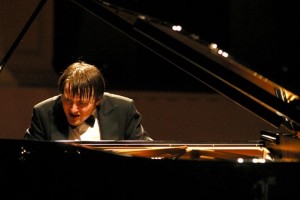
Pianista Daniil Trifonov plays at the Rio Opera House
At 11 a.m. on Sunday, December 27, 2011, from the stage of Rio’s opera house, Julio Ramundo, Director of BNDES, officially inaugurated the BNDES International Piano Festival, the precursor of the Piano Competition which has returned to Rio de Janeiro its place on the world stage among cities recognized as centres of music.
The next speaker was the Vice President of the Bank, Armando Mariante, who recalled the birth of the project during his administration – he was the key figure in obtaining the support of the bank for the Competition – coordinated then, as now, by Lilian Barretto. “The book that we are launching has a special characteristic; through careful research it has brought us valuable previously unpublished information on the life and career of Guiomar Novaes in New York (…) and is accompanied by two CDs of Guiomar playing with the New York Philharmonic in the 1950s and 60s.”
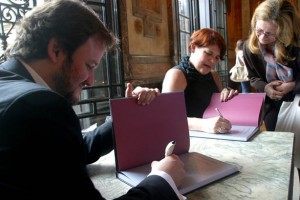
The authors of “Guiomar Novaes of Brazil” sign the book at the opening of the Festival
Joined by the authors of ‘Guiomar Novaes of Brazil’’ – Luciana Medeiros and João Luiz Sampaio, the festival coordinator Lilian Barretto and Guiomar Novaes’ grandson, Luiz Felipe Camargo Pinto (who was accompanied by his son Luiz Eduardo), Julio Ramundo and Armando Mariante also presented the Steinway concert piano acquired by the BNDES International Competition.
Next the Steinway was inaugurated by the twenty-year-old Russian pianist Daniil Trifonov, outright winner of the Tchaikovsky Competition of 2011. He played Chopin, Liszt and Liszt transcriptions of Schubert and Paganini. In the words of José Schiller, who presents the programme A Grande Música on TV Brasil and is also a musician: “A phenomenon, a talent that is still maturing, but with extraordinary dynamics and incredible musicality. Very expressive”. The lawyer Alexandre Martins, an amateur music lover, applauded the concert to which entrance was free: “This festival opening does more than credit to Guiomar Novaes’ instrument; it was a beautiful concert”.
After Trifonov’s recital the authors signed the book in the theatre foyer.
Photos of the opening of BNDES International Piano Festival – 2011
Clóvis Marques’ criticism in Monday’s Opinião e Notícia newspaper
 “He is from the era of the Internet; she from that of the gramophone. He can be heard instantaneously on YouTube; her recordings need to be recuperated. He plays with an appetite bordering on fury, but not without delicacy; she also had fire, with the strength and courage that lay behind a musical personality that emphasised cantabile and beautiful sonority.” This is how Clóvis Marques’ criticism in Monday’s Opinião e Notícia newspaper begins (November 28). See below the main passages:
“He is from the era of the Internet; she from that of the gramophone. He can be heard instantaneously on YouTube; her recordings need to be recuperated. He plays with an appetite bordering on fury, but not without delicacy; she also had fire, with the strength and courage that lay behind a musical personality that emphasised cantabile and beautiful sonority.” This is how Clóvis Marques’ criticism in Monday’s Opinião e Notícia newspaper begins (November 28). See below the main passages:
Guiomar Novaes is recalled in a book and a festival that brings the winners of important international piano competitions to Brazil.
Seeing DaniilTrifonov play a recital dedicated to Chopin and Liszt in Rio’s Opera House – on a brand new Steinway donated by BNDES to the Brazilian Symphony Orchestra – was moving and enlightening.
Moving because the young man plays with a commitment and brilliance that are not only those of a bête à concours: with his longs arms and hands, the physical involvement that uses the entire body, giving the shoulders a central role. Trifonov will no doubt soon have much to say, perhaps when he no longer dedicates his recitals to pieces that show off his technique.
Enlightening precisely because bringing together in a programme only those piano pieces in which Chopin and Liszt give the pianist the greatest opportunities to show off the capacity of his fingers, speed and virtuosity in the strictest sense, can be frustrating: being overwhelming can be tiring…
Even so, it is not easy to find a pianist today who plays Liszt’s transcription of Paganini’s Campanella or Liszt’s first Mesphisto Waltz; this latter with such clarity in the multitude of voices and dynamics, with such control and profusion of sonority. In the Liszt adaptation of Schubert’s Trout Quintet, the volubility of aquatic images was amazing. In the Chopin Études Op 10, if at times the excessive speed and showing off is a little off-putting, Trifonov also enchants us with the ethereal grace of his touch, the brilliance of the sound, a certain corporal, palpable aspect to his féerie, as in Étude nº 8.
Guiomar recalled
Sampaio and Medeiros’ book is not the first (they themselves quote Guiomar Novaes: Uma arrebatadorahistória de amor, by Maria Stella Orsini), but is certainly a novelty as regards the seriousness of its research. The book is centred on the pianist’s life in New York, where she built her career between the 1920s and her death in the 70s, which is places in the context of her whole life and career, as well as examining the great appreciation of her art, backed up with an abundance of testimony and sources.
João Marcos Coelho’s criticism in the Estado de São Paulo of the BNDES International Piano Festival and the book ‘Guiomar Novaes of Brazil’
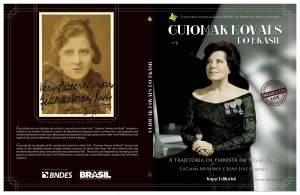
In this Saturday’s Estado de São Paulo newspaper, the critic João Marcos Coelho writes about the BNDES International Piano Festival and the book Guiomar Novaes of Brazil, by Luciana Medeiros and João Luiz Sampaio, that will be launched this Sunday, November 27, at 11 a.m, with a recital by the Russian pianist DaniilTrifonov in the Rio de Janeiro Opera House. “Do the book and the recordings now brought before the public for the first time add to the biographical and professional information about Guiomar Novaes, and above all to Guiomar as an interpreter? In both cases the answer is most certainly yes”. See below the main passages of the article:
Do the book and the recordings now brought before the public for the first time add to the biographical and professional information about Guiomar Novaes, and above all to Guiomar as an interpreter? In both cases the answer is most certainly yes. To begin with, anything relating to Guiomar Novaes is a motive for celebration, as more than thirty years after her death, in March 1979, we still know very little about this extraordinary pianist, who is rightly placed among the greatest of the 20th century.
Reading this book is also an indication that fortunately we have gone beyond the point of mere fan admiration in this type of literature. Guiomar Novaes of Brazil inaugurates a new era of selective, objective research about the pianist, focussing above all on her years in the United States, which represent over half a century of intense activity. Much of the data collected by Sampaio and Medeiros speaks for itself: between 1916 and 1966 she presented 27 different programmes in 51 concerts with the New York Philharmonic. During this period she was conducted by such distinguished maestros as Wilhelm Furtwängler, John Barbirolli, George Szell, André Cluytens and Leonard Bernstein.
….
As can be imagined, everyone writing in the North American press wanted to decipher the Guiomar Novaes enigma. Noel Straus, for example, defined her as belonging to the “class of pianists with more vivid imagination that tend to recreate a given composition differently at each presentation of it, according to the mood of the moment.”
In other words, intuitive, like Nelson Freire today. Straus came very close. However, on page 131 Sampaio and Medeiros seem not to agree with this “picture of a purely intuitive artist, unable to articulate her art in an intellectual way.” And whom do they quote? Precisely Nelson Freire, another intuitive artist who cannot, or rather does not wish to, explain his art. He prefers to demonstrate it by playing, like Guiomar. Freire never repeats an interpretation. He is not like those musicians who prepare an interpretation of a piece of music and then freeze it. A point to Guiomar and a point to Neslon, without a doubt.
…..
To sum up, he and she, with identical DNA, offer the “mood of the moment” on the stage. And it is here that the charm and geniality of Guiomar lie – and those of Nelson. He also shares with her his relationship with the instrument. “Pianos have a soul,” she says. “This piano doesn’t like me,” Nelson observes, looking distrustfully at the Steinway in the Sala São Paulo in João Moreira Salles’ documentary.
There is still a lot missing before we have a complete picture of Guiomar Novaes. There are still people who have important collections about her, but in their provincial way think they are the ‘owners’ of this documentation to which the world has a right. This book and the two CDs, without a doubt, mark the beginning of more professional research into the “country of pianists” as Mário de Andrade would have said.’ / J.M.C.

